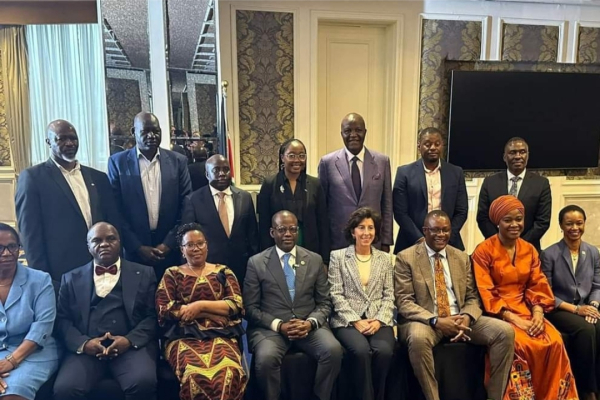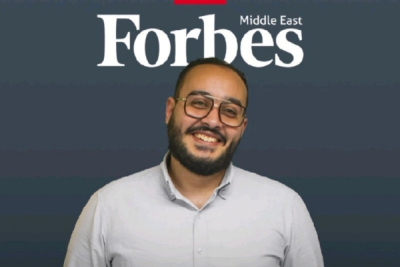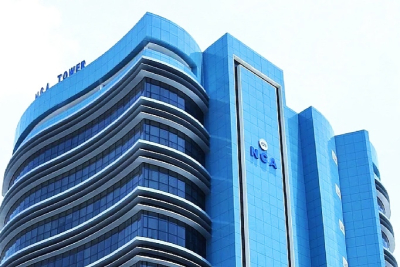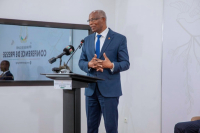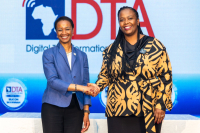Data centers are becoming the backbone of cloud services adoption. They provide users with everything they need to get started – online storage, computing power, software, servers, and applications – all accessible over the internet.
From 2012 to 2022, the number of data centers in West and East Africa saw a significant increase, jumping from 9 to 134. This information was highlighted in the "Digital Progress and Trends Report 2023" published by the World Bank in March 2024.
The report explains: “Development funding for data centers is increasing to fill the financing gaps. In Africa, where an estimated annual investment of between US$4 billion and US$7 billion is needed to bridge the region’s data center gap, the US International Development Finance Corporation is providing funding of US$300 million to Africa Data Centers to support the expansion and development of seven existing and greenfield data centers in five African countries.”
The ongoing technological revolution in Africa, accelerated by the digital transformation spurred by the COVID-19 pandemic, has made digital infrastructures, especially data centers, essential. An increasing number of globally recognized providers have established a presence on the continent, leading to a rise in the number of these infrastructures in Africa.
Several American companies, including Raxio Data Centres, Digital Realty, and Oracle, along with France's Orange and China's Huawei, have set up operations in various African countries. Local entities like Africa Data Centres, Paix Data Centres, Onix Data Centres, and MainOne continue to expand across the continent. In addition to private sector involvement, African governments are also investing in these infrastructures in their pursuit of digital sovereignty.
The "Cloud Computing Market" report published in December 2023 by U.S.-based market research firm MarketsandMarkets projected that the global cloud market would grow from $626.4 billion in 2023 to $1,266.4 billion by 2028, with a compounded annual growth rate of 15.1%. While this growth is promising, Africa and the Middle East hold marginal shares compared to North America, the undisputed leader in the sector, according to the same source.
Adoni Conrad Quenum
Guinea is working on several digital projects and is seeking experienced partners to effectively bring them to fruition. The West African country is eager to move forward quickly with the implementation of these projects.
Guinea and the United States have expressed a shared interest in digital sector collaboration. Aminata Kaba, Guinea's Minister of Technical Education and Vocational Training, and U.S. Secretary of Commerce Gina Raimondo discussed this during the Smart Africa ministerial roundtable in Nairobi on Thursday, April 25th.
The meeting centered on the challenges and opportunities of digital transformation in Guinea and Africa at large. The need to bolster cooperation in Information and Communication Technologies (ICT) between the two nations was also emphasized, as noted by the Ministry overseeing the Digital Economy.
The discussions specifically focused on enhancing ICT cooperation, including an ongoing partnership with U.S. firm Cisco to establish a Networking Academy in Guinea. The dialogue also explored potential joint initiatives between Africa and the U.S. aimed at facilitating access to and adoption of technologies suited to the continent's needs.
Following the meeting, the Secretary of State announced an upcoming initiative that will offer young Africans the chance to participate in immersion experiences within the U.S. startup ecosystem, particularly in Silicon Valley.
The meeting forms part of Guinea's efforts to develop its digital sector through partnerships. For the U.S., it presents an opportunity to seek collaborations that will further the Digital Transformation in Africa (DTA) project. This government initiative seeks to broaden digital access across the continent. As part of this project, the U.S. invested $82 million in 2023 towards new digital infrastructures, digital projects, and technical programs in Africa.
Samira Njoya
With more than two decades of experience in investment across Africa and beyond, he has now embarked on an entrepreneurial journey. His goal is to make access to credit a reality for all Africans.
Chijioke Dozie (photo), a Nigerian entrepreneur and investor, co-founded Carbon in 2012 with his brother, Ngozi Dozie. As the CEO, he is dedicated to making credit accessible to all Africans.
Carbon's mission is to ensure that everyone has the financial access they need to lead a dignified and prosperous life. The startup offers a range of services, including credit services, payment solutions, high-yield investment opportunities, and easy-to-use financial management tools, all aimed at empowering its users.
Headquartered in Lagos, Carbon has a team of over 90 employees and operates in both Nigeria and Ghana. The company, under the OneFi brand, has already launched several lending services, including the consumer loan mobile app, Paylater. To date, Carbon has served more than 3 million people.
Chijioke Dozie earned his Bachelor's degree in Economics from the University of East Anglia, UK, in 1999. He then obtained a Master's degree in Finance from the University of Reading in 2000. In 2008, he earned an MBA from Harvard Business School.
Before becoming an entrepreneur, Chijioke Dozie worked as an investment associate for the investment manager Zephyr Management from 2001 to 2004. He then joined the International Finance Corporation (IFC) as an investment analyst in 2004. In 2008, he became a partner at Kaizen Venture Partners, a private equity firm based in Lagos, Nigeria. From 2021 to 2022, he served as the chairman of the board for the media company, Pulse.
Melchior Koba
A seasoned agrotech entrepreneur with over eight years of experience, he empowers Egyptian agriculture professionals with innovative solutions.
Egyptian tech entrepreneur Fady Ibrahim (photo) is the co-founder and CEO of Cropsa. This platform, which he established in 2021 alongside Abanob Gamal, is designed to streamline the buying and selling of agricultural inputs and raw materials. By doing so, it aims to minimize production losses and bolster local farmers. Cropsa enables suppliers and traders in the agriculture industry to carry out their transactions online, enhancing the accessibility and efficiency of their operations.
Beyond its primary functions, Cropsa also features an advertising service known as Cropsa Business. This service allows users to advertise their products or services via a personalized dashboard. It provides tools for audience targeting and campaign creation, enabling users to effectively reach potential customers.
Cropsa also offers a recruitment service for agricultural enterprises, assisting them in finding talents that fit their specific requirements. Its recruitment platform allows users to evaluate and compare the most qualified candidates, thereby simplifying the hiring process.
Fady Ibrahim graduated from Ain Shams University in Egypt in 2019 with a bachelor’s degree in agriculture. He also earned a diploma in marketing from Harvard University in the same year. In 2021, he obtained a master’s degree in agricultural business and management from the Arab Academy for Science, Technology, and Maritime Transport.
Ibrahim began his professional journey in 2016 at Mazr3ty, a marketing services platform specializing in animal, poultry, and fish production, where he served as the marketing manager. He held the same role at the Central Food Safety Laboratory, a food safety lab, from 2017 to 2018. In 2018, he joined Spinneys Egypt, a supplier of food and household items, as the supervisor of research and development. From 2021 to 2022, he was the head of agriculture at Lychee, a company that delivers natural and fresh products like dairy and fruit juices to its customers.
In 2023, Forbes Middle East recognized Ibrahim named him one of the 30 most influential individuals under 30 in the “commerce and finance” category.
Melchior Koba
By leveraging satellite broadband services like Starlink, Africa can address connectivity challenges, harness the potential of the digital economy, and accelerate economic development across various sectors.
The National Communications Authority (NCA) has granted Starlink approval to provide satellite broadband in Ghana. This follows the Ministry of Communications and Digitalization's approval of the Satellite Licensing Framework, an NCA press release dated April 25 revealed.
The NCA confirmed Space X Starlink GH LTD's application approval to offer Satellite Broadband Services in Ghana. Administrative procedures for issuing the license are underway, the release added.
This announcement follows Starlink's impending discontinuation of services in Ghana from April 30, 2024, due to a lack of the required license.
The Africa Mobile Infrastructure and Mobile Broadband Market Report 2022 highlights that mobile networks dominate the African telecommunications markets, handling up to 98% of voice and data traffic while comprising the majority of voice and internet connections. Yet, insights from "The State and Future of LEO Satellite Internet Connectivity in Africa" report, released in January 2022, suggest that MIT research predicts satellite technology will bolster internet access in Africa within the next five years, particularly in remote areas hampered by terrestrial-based system limitations. This advancement aims to bridge connectivity gaps and diminish the digital divide.
The approval is timely as Ghana and other West African countries encountered an internet outage on March 18 due to submarine cable disruptions, impacting various sectors such as commerce, academia, economy, and social activities. This incident underscored the significance of satellite broadband services.
Hikmatu Bilali
This startup is named after 16th-century Algerian scholar, Ibn Hamza Al-Maghribi. It aims to improve the quality of healthcare and medical practices through innovation.
eTabib is an e-health platform developed by the Algerian startup Ibn Hamza, allowing users to access healthcare services online through a mobile application. Founded in 2016 by Mostefa Nabil and based in Algiers, this healthtech company aims to improve the quality and safety of care, as well as the working conditions for healthcare professionals.
The app is available on Huawei's AppGallery and the Android Play Store, boasting over 5,000 downloads. Users can register with their personal information and access various services, including finding doctors for online consultations or posing medical questions to healthcare professionals.
Online consultations are a key benefit of the app, saving time and eliminating the need for waiting in lines. This feature became especially valuable during its 2020 launch amidst the COVID-19 pandemic, giving it a competitive edge.
Additionally, the platform includes a feature for online medical records. Patients have a medical record that updates based on their medical history, allowing doctors to provide more efficient care in future consultations and helping to reduce health expenses by minimizing redundant tests and x-rays.
Doctors, from general practitioners to specialists, can join the eTabib network, which claims to have over 40,000 doctors and clinics across Algeria.
Adoni Conrad Quenum
Guinea has initiated the digitization of public services. This initiative aims to enable the country to benefit from the digital economy and requires the involvement of workers in this sector.
Guinean Prime Minister Amadou Oury Bah unveiled two new digital platforms on Wednesday, April 24th. The two platforms dubbed “e-Learning” and “e-conseil” aim to boost efficiency through innovative training and management tools for civil servants.
Developed with the National Agency for Universal Telecommunication and Digital Services, "e-Learning" provides online courses, accessible even without internet. These courses will enhance civil servants' skills in various fields and familiarize them with essential computer tools. Participants can earn verifiable certificates upon successful completion of training.
"e-conseil" allows different government departments to automate communication and workflow. This platform facilitates remote collaboration among government officials, allowing them to contribute to inter-ministerial council and cabinet meeting preparations, ultimately saving valuable time. Security is a top priority, with the platform employing robust, internationally compliant solutions. Data is securely hosted by the Regulatory Authority for Posts and Telecommunications (ARPT).
These platforms represent the Guinean government's commitment to digitizing and modernizing its administration. These digital solutions will equip civil servants with the necessary Information and Communication Technology (ICT) skills to thrive in the country's ongoing digital transformation. Their launch follows a recent workshop where the Prime Minister emphasized the importance of a unified effort to accelerate the digitization of Guinea's public administration.
Samira Njoya
In recent years, Huawei has become a focal point in the trade dispute between China and the United States. This has compelled the company to make a number of strategic shifts, such as overhauling its supply chain and creating a new operating system for its flagship devices.
Chinese tech giant Huawei is calling on developers to create applications for its homegrown HarmonyOS operating system. The announcement came from Eric Xu, Vice Chairman and Rotating Chairman of Huawei, during the 21st Huawei Analyst Summit held April 17-19 in Shenzhen, China.
"We call on all app developers and owners in China to join our HarmonyOS-native app ecosystem as soon as possible, and work together to deliver a better experience to consumers," Xu said. He emphasized strengthening the native app ecosystem as a key objective for 2024. "This is a massive undertaking," he acknowledged, "but we have broad support in the industry and from many app developers."
The development of HarmonyOS stems from US sanctions imposed on Huawei in 2018 and intensified by President Trump in 2021. These sanctions aimed to limit Huawei's access to key technologies, including Google's Android operating system. Facing a market dominated by Android (with 70.79% market share) and Apple's iOS (28.46% share according to StatCounter in March 2024), Huawei needed an alternative solution.
With a goal of exceeding one million applications in its native ecosystem, Huawei has invested in developer training. Over 380,000 developers have already obtained HarmonyOS certification, and the company reports that more than 135 universities in China now offer HarmonyOS courses, as detailed in their annual report published in late March.
Adoni Conrad Quenum
In recent years, the innovation ecosystem for sporting events has experienced a significant upswing, marked by the rise of highly promising startups. As this sector continues to grow rapidly, numerous initiatives are being launched to support its expansion, particularly in Africa.
The National Basketball Association (NBA) announced the launch of the "Triple-Double: NBA Africa Startup Accelerator" on Thursday, April 25. This continent-wide initiative focuses on early-stage African startups in the sports sector.
The accelerator aims to fuel Africa's tech ecosystem by providing mentorship, capital, and growth opportunities to the next generation of African tech entrepreneurs. Led by ALX Ventures, a prominent tech incubator, the program targets startups developing solutions in event management and ticketing, youth development, artificial intelligence, and digital marketing within the sports and creative industries.
The launch aligns with two key initiatives: President Biden's 2022 Digital Transformation with Africa (DTA) program, fostering stronger US-Africa collaboration in digital transformation, and the US Department of Commerce's Africa strategy, which promotes investments in priority African projects and continental economic development.
For the inaugural cohort, ten startups will be chosen. They'll receive mentorship from a combined team of NBA Africa and ALX executives, along with private sector experts, who will provide guidance on product development, business growth, and market entry strategies.
In September, the selected startups will showcase their products at a New York City Demo Day to a panel of industry leaders from the US, Africa, and across the globe. Following this, four winning companies will be awarded financial support, continued mentorship, and the chance to collaborate with NBA Africa and the Basketball Africa League (BAL) on current and future initiatives across the continent.
Sports-focused startups interested in applying have until May 31st to register.
Samira Njoya
Financial technology is rapidly gaining traction across the continent. Even with the limited availability of venture capital, the number of startups in this sector continues to grow. These emerging businesses are consistently introducing innovative solutions for the public.
AdwaPay is a financial technology solution developed by the Cameroonian firm Adwa Sarl. It enables businesses and online commerce platforms to receive mobile payments. Founded in 2017 by David Christian Mbang, the startup is based in Douala.
Rather than a mobile app, AdwaPay is available as a web platform. It provides documentation to enable integration, with businesses also having the option to reach out to the startup for assistance in the process. Once integrated, businesses can accept payments through Orange Money, PayPal, Express Union, and credit cards.
AdwaPay incorporates a dashboard that allows for real-time transaction monitoring. It features Adwamoney, a digital wallet that gives businesses and e-commerce platforms instant access to their funds. Additionally, its online store, Adwashop, enables users to order or pay for listed products or services.
The solution guarantees transactions up to XAF825 million (approximately $1.3 million). It claims more than 3,000 transactions daily and over 240 satisfied clients. In 2020, it signed a partnership agreement to establish a digital bank with Gabonese fintech Fedha, aiming to facilitate access to financial services for the region's populations excluded from the traditional banking system.
Adoni Conrad Quenum
More...
EMpact has a presence in multiple markets around the world. For its initial foray into Africa, the company has chosen Côte d’Ivoire.
As part of its launch in West Africa, EMpact, an American investment firm that fosters entrepreneurial initiatives of young talents to accelerate startups serving vital value chains in frontier markets, has selected the Institut National Polytechnique Félix Houphouët-Boigny (INP-HB) and the International University of Grand Bassam (IGUB) in Côte d’Ivoire as its academic partners.
The program is designed to spark innovations in the agricultural value chain and promote sustainable practices, not only in Côte d’Ivoire but across the West African region, where the studio intends to expand. In this context, both current students and alumni from partner universities and others will benefit from entrepreneurial guidance through a hybrid training program provided by the partner academic institutions and EMpact’s global program. Following the training, there will be an incubation phase succeeded by a startup accelerator offering ongoing mentorship and continuous training to the participants.
For the Ivorian partners, particularly INP-HB, this program is poised to play a pivotal role in the development of agricultural entrepreneurship and, consequently, the African economy, which is heavily reliant on this sector.
“We believe in the fundamental role that entrepreneurship plays in the development of a country. One of the main challenges facing our countries is job creation and the placement of our young graduates. This partnership is a relevant response to the growth in student unemployment as it strengthens links between our research system and the valorization of outcomes through innovative companies. Agriculture, which remains one of the key pillars of development in African countries, is the primary beneficiary. Entrepreneurship is gaining unprecedented momentum in our region, which makes this partnership even more relevant and timely for us,” stated Moussa Diaby, the Director-General of INP-HB.
In West Africa, EMpact will follow the model already being used in Guatemala, Central America. By 2025, EMpact plans to incorporate other frontier markets, such as those in Central Asia, and begin to interconnect these markets through the cross-pollination of ideas, capitalizing on their inherent similarities and complementarities.
Vanessa Ngono Atangana
Launched in 2011, the African Entrepreneur Award returns annually with new challenges while maintaining a constant goal: to encourage entrepreneurship, support innovation in Africa, and contribute to the socio-economic development of the continent.
Africangels, Africa's leading angel investor network, announced on Thursday, April 25, the opening of applications for the 8th edition of the African Entrepreneur Award. This prestigious competition aims to acknowledge African and international entrepreneurs who have made a significant impact in Africa.
This year, five major awards will be presented to the winners. The African Entrepreneur of the Year Award will honor the individual whose entrepreneurial impact has been the most significant. The African Startup of the Year Award will be given to a young entrepreneur with high potential. The Next Impact Award will reward leaders for their impact on the economy and their innovative solutions to societal challenges. Lastly, the African'Elles Award will be dedicated to innovative women who propose solutions to societal, economic, and environmental challenges.
The African Entrepreneur Award will provide winners in thematic categories with opportunities for expansion by offering advisory support, access to international networks, financing opportunities judged by a panel of investors, as well as extensive media visibility. Additionally, winners will receive an endowment of up to €40,000.
The competition will take place in two stages. The first stage is a regional call for applications that will run from April to August 2024. At the end of this period, a selection will be made in six regions to identify three regional finalists, who will automatically qualify for the international phase. The second phase, which will be international, will take place in November of the same year. A final jury composed of influential personalities will then designate the winners of the African Entrepreneur Award. Applications for this year’s edition are open till August 20.
Samira Njoya
His goal is to simplify the process for businesses in Ethiopia to receive their payments. Leveraging the digital skills he gained in China, he is working on the development of a fintech platform named Chapa to fulfill this purpose.
Nael Hailemariam (photo), a co-founder and the CEO of Chapa, is leading the charge to streamline financial transactions between businesses and their clients in Ethiopia. Established in 2021, Chapa is a payment gateway that enables to easily entrepreneurs, small and medium-sized enterprises (SMEs), and large corporations to accept digital payments. Chapa’s comprehensive platform brings together various payment methods, including bank transfers, debit card transactions, and digital payments.
Chapa’s mission is to lower transaction fees, increase revenue, and boost operational efficiency for businesses. By addressing a broad spectrum of payment needs, the startup simplifies financial operations and fosters the development of innovative business models.
In addition to his role at Chapa, Hailemariam also serves on the board of the Innovative Finance Lab Ethiopia, an organization dedicated to enhancing access to financing for SMEs and startups in Ethiopia. This initiative is a collaborative effort between the National Bank of Ethiopia and the United Nations Development Programme (UNDP).
Hailemariam holds a bachelor’s degree in computer science from Addis Ababa University, earned in 2014, and a bachelor’s degree in electronic and information engineering from Beihang University in Beijing, earned in 2018. He completed a master’s degree in data science and computer engineering at Tsinghua University in China in 2021.
Prior to embarking on his entrepreneurial journey, Hailemariam gained invaluable experience as an assistant professor of computer science at Beihang University from 2017 to 2018. From 2019 to 2020, he served as the director of the Design + Space Laboratory at Tsinghua University, a design lab and workspace for students.
Melchior Koba
After completing her university studies in computer science in London, she returned to Gambia. She is now contributing to her country's development by fostering entrepreneurship and technological innovation.
Beran Dondeh Gillen (photo), a Gambian entrepreneur and computer scientist, co-founded and currently serves as the CEO of The Hub. Established in October 2019, The Hub is a technology incubator dedicated to filling the gaps in Gambia’s entrepreneurial ecosystem.
The Hub is devoted to aiding entrepreneurs in their journey by offering incubation programs, training, acceleration sessions, and mentorship and coaching opportunities. It also provides modern, collaborative workspaces. The Hub caters to a diverse array of entrepreneurs, including young adults aged between 18 and 35, and aims to impact 1,500 individuals by 2025. To date, it has supported over 194 entrepreneurs, benefited more than 953 individuals through its programs, organized over 37 events, and conducted more than 30 training sessions.
In addition to her role at The Hub, Gillen holds a directorial position at Morem Consulting and Advisory Services, a firm specializing in financial and technical consulting. She also serves as the chairperson of the Information Technology Association of The Gambia.
Gillen is a graduate of Middlesex University in London, where she earned a Master’s degree in Network Management in 2006. She embarked on her professional journey in 2002 at De La Rue, a security company, serving as a project manager. In 2007, she transitioned to the fintech company EazyPAY, taking on the role of Director of Operations.
In October 2023, Gillen was recognized as the “ICT Icon of the Year” at the ICT Expo in Gambia, a testament to her dedication and significant contributions to the advancement of technology and entrepreneurship in Gambia.
Melchior Koba



